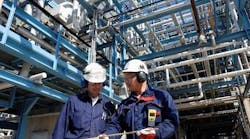A common rumbling and grumbling over the past few years here in the United States has been on the need for a renewed commitment to Science, Technology, Engineering, and Mathematics (STEM) education. And with this heightened focus on STEM, it seems we are beginning to see some progress, particularly with new funding and investment in STEM at the university and high school level. This should help breathe new life into STEM fields five to 10 years down the road. But in the near term, as those cagey old vets continue to take “early retirement,” what is being done to provide continuing education and professional development to our current STEM workforce, which is getting younger and younger and less and less experienced? Here too, it seems there are signs of new investment in training programs.
For example, I recently attended a launch event for Endress+Hauser’s new Process Training Unit (PTU) just outside Philadelphia (see my FlowStream blog post for more). The facility is the product of a joint partnership between Endress+Hauser and Rockwell Automation, and it features a state-of-the-art process system outfitted with all of Endress+Hauser’s latest instrumentation and Rockwell’s control systems. The PTU is part of a larger effort by the two organizations to provide hands-on training to engineers, operators, and technicians on the finer points of modern plant systems design.
Along this line, Endress+Hauser is offering a full schedule of instrumentation-oriented trainings at its PTUs located throughout the U.S., while Rockwell is offering training focused on control systems.
Here at Flow Control, we too are committed to continuing education and professional development, having worked with our regular columnist Larry Bachus (a.k.a. “The Pump Guy”) to present the Pump Guy Seminar since 2007. And we’re now working with David W. Spitzer, another regular Flow Control columnist, to present his popular Industrial Flow Measurement Seminar.
In fact, I was in New Orleans last month for trainings with Larry and David. Much of our conversation during the off hours revolved around the critical situation many industrial companies in the U.S. now face as they lose their experienced technical professionals. Valuable in-house experience is disappearing every day at companies across the country. But is it being replaced? Unfortunately, in my experience, it is not—at least not quickly enough.
Consider this … I speak with folks all of the time who are interested in attending our pump and flow trainings. Yet, interest is only half the battle. More often than not, those interested folks never actually make it to our trainings because either: a. they are so swamped with work that they can’t afford to get away for a few days of training; or b. they can’t get their boss to approve the expense. I find this unfortunate because: a. we are working hard to grow our training program, and we need as many attendees as possible to do this; and b. more importantly, it’s hard to see how the U.S. can continue to compete in the upper echelons of manufacturing and industry if its workforce isn’t given the opportunity to learn and develop their skillset.
Perhaps this trend is merely a product of the economy we have been operating in over the past several years. My hope is that as companies get back on solid footing, they will recognize the need to strategically and aggressively invest in training their workforce to regain some of the technical knowhow they have lost. While cost-cutting is clearly necessary in some instances, it’s not the foundation of a successful business, particularly when such cost cutting is at the expense of the human capital on which a company’s future relies. You are what you know.
– Matt Migliore, Executive Director of Content[email protected]


